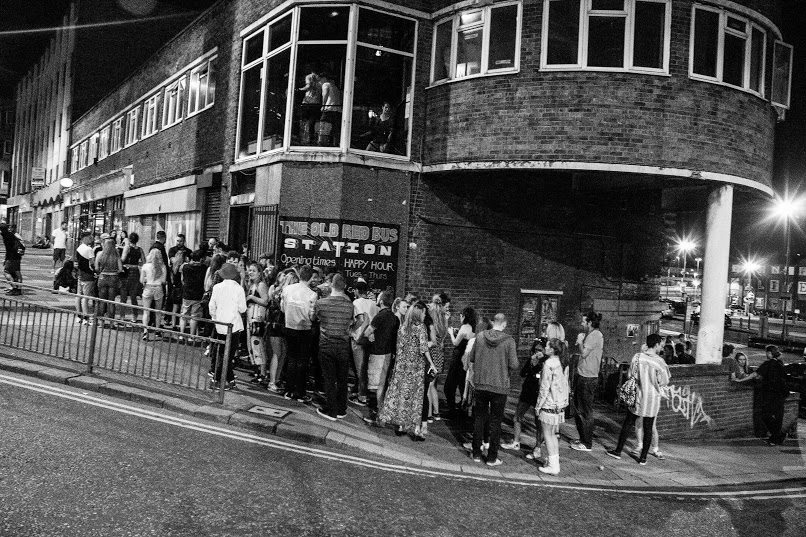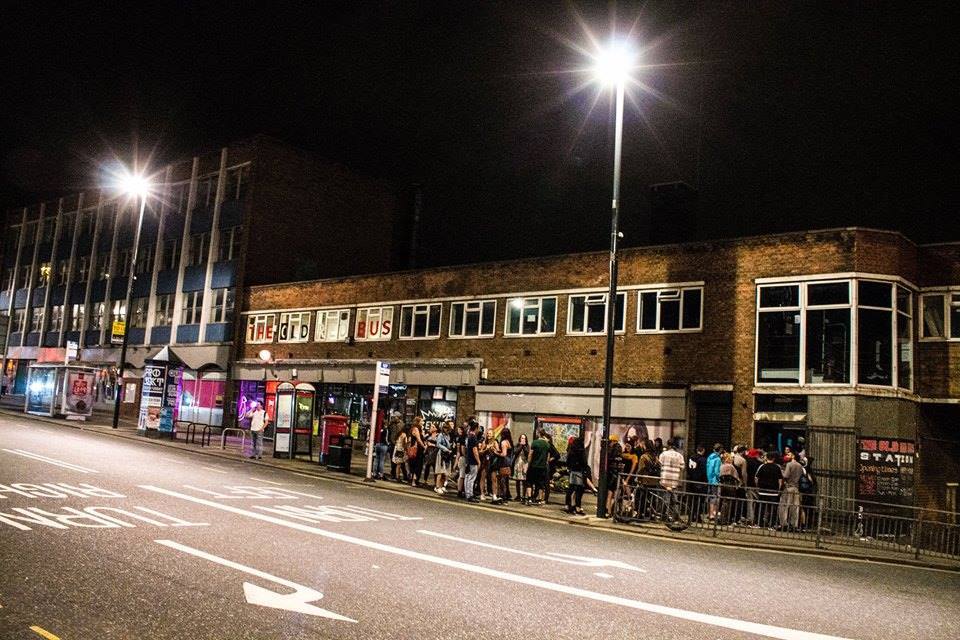Why are we losing our venues? with Old Red’s Alex Wilson – interview

Queue outside Old Red Bus Station. Source: Alex Wilson
In the wake of its closure, we caught up with Old Red Bus Station’s Alex Wilson about why the Leeds club, like so many others, couldn’t continue. For further reading, our editor Izzy writes a love letter to the venue.
It’s Independent Venue Week: a time for us to acknowledge the absolute grind that those running our grassroots gig spaces have to go through, and the immeasurable impact they are having for our country’s cultural ecosystem.
Leeds is known and loved for having one of the strongest grassroots scenes in the UK, buoyed by a network of spaces that support all genres and catapult careers. But the grassroots mood in Leeds will feel flat heading into February, following more significant closures in its venue ranks. Old Red Bus Station, a temple for drum n bass and beloved club, announced its demise in January. Another blow to the city and to electronic music. Citing financial pressures and uncompromising landlords, Old Red’s fate is a familiar tale. They join Boom, Sheaf Street & Wire, to name a few that Leeds has recently lost.
I caught up with Alex Wilson, the former Bookings Manager at Old Red, to talk about what’s happening to our grassroots music venues (GMVs), and what specifically is going on in Leeds. Though still in the sore aftermath of the venue’s final goodbyes, Alex was able to expand on the reasons Old Red couldn’t continue, and painted a picture of a struggling club scene, recognisable across the country.

Alex outside Old Red Bus Station. Source: Alex Wilson
“First and foremost, it’s the cost of living,” says Alex, upfront. It’s brutally true. Inflation is hamstringing everyone – venue rents have gone up, utilities have increased, suppliers charge more, whilst the consumer has less to spend on their night. The Music Venue Trust published their annual report on the grassroots sector last week, and claim this amounts to an average profit margin for venues of 0.48% – for those with turnover under £500k, this was likely to be a negative margin in 2024. Most GMVs are teetering. Last year, clubs were closing at a rate of 3 per week in the UK and Yorkshire was the region most affected.
The specific government response to help GMVs has had limited impact. Business relief hasn’t made enough difference; in April, it will be cut further, which any venues currently living on the edge will be dreading. Last November, the national government announced its support of a ticket levy on big venues and events to balance the industry, but pushed back on further immediate fiscal measures, deferring to the £5m more put towards Arts Council England’s Grassroots Music Fund back in 2023.
But, as Alex highlights, this isn’t a useful fix for GMVs, and nightclubs especially. “It’s all geared towards museums and classical music,” he says of the ACE grant application process, explaining that, “unless you can afford a professional bid writer”, or have the resource and experience for fundraising that, say, theatre or visual arts organisations likely have in-house, then this becomes an expensive, time consuming task.

Old Red Bus Station dance floor. Source: Alex Wilson
This model serves the subsidised arts sector and excludes venues, creating a feeling that venues, and clubs especially, are seen as just businesses, and not ‘culture’ – a sentiment that’s been evident since lockdown. Nightclubs, who rely on later closes and loud music, have to fend off public complaints and local government pressure in ways other spaces don’t, without special consideration for their community value.
Alex argues for more “safeguarding” of clubs as if they are “cultural institutions”, pointing to Liverpool as inspiration, the city where ‘agent of change’ policies have been introduced to protect established venues from the threat of noise complaints coming from any newly developed residencies. Local councils can’t be expected to intervene for every venue under pressure, but a policy like this does more in the long run to ensure development and venues aren’t in conflict. In Leeds especially, the issue of property development repeatedly comes up, be it the cases of Sheaf Street in 2023 or MAP Charity last year. It’s impossible to walk around the city without noticing the rate of building taking place – the potential knock-on effects of complaints from new neighbours, increased rents, or building landlords outright selling to developers, is worrying for grassroots operators.
Major housing expansions will continue, and Alex fears for the impact this will have on remaining spaces. He points out that Freedom Mills has “400 houses going up next to it” in place of Aire Street Workshops. Proactive policies like ‘agent of change’ could prevent potential fallout when works get underway.

People queue outside Old Red Bus Station. Source: Alex Wilson
And then of course, there is the concerning, complicated issue of “the changing patterns of people going out” post-COVID. People, and especially students, are clubbing & gigging less. Finances, healthier lifestyles, nighttime safety concerns and a gap in knowledge of ‘where to go’ created during lockdown, have all contributed. And in cities like Leeds, which are especially – perhaps overly – reliant on their student population to feed the industry, these changes have big effects.
Before lockdown, Old Red would sell “400 tickets for a 500 cap venue each event… now we’d be lucky to shift 200.” Ticket sales were not the money makers for GMVs, but it’s all the money this wipes off the bar that’s denting revenue. And with money tight, clubbers are attending events more selectively at the grassroots’ expense. “People are used to buying a ticket for these massive lineups where they can spend £30 for 50 headliners,” says Alex. “They’re not going to spend a tenner on a ticket at small venues.” He suggests consumers want “instant gratification” thanks to the influence of constant short form content, undermining the joy of the night-long journey that small clubs want audiences to go on.
So, what can be done? The factors causing closures which our small venues have to face daily are many, and some are much too big for a venue, or even a sector, to take on. But some actions could make a difference.
The Music Venue Trust, NTIA and similar organisations support the sector through guidance, advocacy and small financial support. They should be followed and amplified. Artists, publications, and private sector partners can continue to encourage the public and government, local and national, to think differently about GMVs and help them get the same opportunity and protection as other sectors. Locally, No Space Left To Play and the Leeds Night Time Economy Group are making the case for the value of our venues and need your engagement.
And though we can’t control audience behaviour, we can keep hammering the message home: the grassroots need your support. Not once the doors have closed, but now. This is Alex’s departing request:
“Go to HiFi, go to Freedom Mills, go to Beaverworks, go to Mint Warehouse, go to Distrikt, please,” he says. “The best nights are not the big nights – it’s the intimate events full of proper music lovers. Support them and support emerging talent, because if you don’t… there’ll be no talent, there’ll be no pipeline, there’ll be no future.”
***
Filed under: Music

Comments